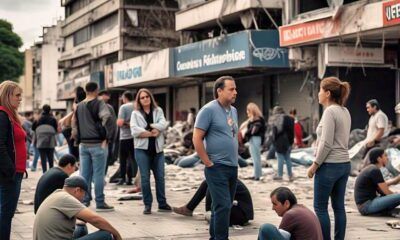INTERNACIONAL
Ecuador’s presidential election goes to runoff between conservative incumbent, leftist lawyer

- Ecuador will choose its next president in a runoff election in April between conservative incumbent Daniel Noboa and leftist lawyer Luisa González.
- Crime is a major issue for voters. The trafficking of cocaine produced in neighboring Colombia and Peru has contributed to skyrocketing rates of homicide, kidnapping and extortion.
- Ecuador’s National Electoral Council said that with 92.1% of the ballots counted, Noboa received 44.31% of the voite, while González received 43.83%. The 14 other candidates in the race were far behind them.
Ecuador will choose its next president in a runoff election in April between conservative incumbent Daniel Noboa and leftist lawyer Luisa González.
Neither won outright in Sunday’s first-round election, but they were both well ahead of the other 14 candidates and each within a percentage point of garnering 44% of the vote, according to results Monday.
The run-off election set for April 13 will be a repeat of the October 2023 snap election that earned Noboa a 16-month presidency.
EXCLUSIVE LOOK INTO TRUMP REPATRIATION FLIGHT ON C-17 MILITARY PLANE TO ECUADOR
Noboa and González are now vying for a full four-year term, promising voters to reduce the widespread criminal activity that upended their lives four years ago.
The spike in violence across the South American country is tied to the trafficking of cocaine produced in neighboring Colombia and Peru. So many voters have become crime victims that their personal and collective losses were a determining factor in deciding whether a third president in four years could turn Ecuador around or if Noboa deserved more time in office.
Noboa, an heir to a fortune built on the banana trade, and González, the protégée of Ecuador’s most influential president this century, were the clear front-runners ahead of the election.
Ecuador’s President Daniel Noboa, running for re-election, waves after accompanying his running mate, Maria Jose Pinto, to cast her ballot during the presidential elections in Quito, Ecuador, on Feb. 9, 2025. (AP Photo/Carlos Noriega)
Figures released by Ecuador’s National Electoral Council showed that with 92.1% of the ballots counted, Noboa received 4.22 million votes, or 44.31%, while González received 4.17 million votes, or 43.83%. The 14 other candidates in the race were far behind them.
Voting is mandatory in Ecuador. Electoral authorities reported that more than 83% of the roughly 13.7 million eligible voters cast ballots.
Crime, gangs and extortion
Under Noboa’s watch, the homicide rate dropped from 46.18 per 100,000 people in 2023 to 38.76 per 100,000 people last year. Still, it remains far higher than the 6.85 per 100,000 people in 2019, and other crimes, such as kidnapping and extortion, have skyrocketed, making people fearful of leaving their homes.
«For me, this president is disastrous,» said Marta Barres, 35, who went to the voting center with her three teenage children. «Can he change things in four more years? No. He hasn’t done anything.»
Barres, who must pay $25 a month to a local gang to avoid harassment or worse, said she supported González because she believes she can reduce crime across the board and improve the economy.
Noboa defeated González in the October 2023 runoff of a snap election that was triggered by the decision of then-President Guillermo Lasso to dissolve the National Assembly and shorten his own mandate as a result. Noboa and González, a mentee of former President Rafael Correa, had only served short stints as lawmakers before launching their presidential campaigns that year.
To win outright Sunday, a candidate needed 50% of the vote or at least 40% with a 10-point lead over the closest challenger.
More than 100,000 police officers and members of the military were deployed across the country to safeguard the election, including at voting centers. At least 50 officers accompanied Noboa, his wife and their 2-year-old son to a voting center where the president cast his ballot in the small Pacific coast community of Olón.
Testing the limits of laws and norms of governing
Noboa, 37, opened an event organizing company when he was 18 and then joined his father’s Noboa Corp., where he held management positions in the shipping, logistics and commercial areas. His political career began in 2021, when he won a seat in the National Assembly and chaired its Economic Development Commission.
As president over the past 15 months, some of his mano dura, or heavy-handed, tactics to reduce crime have come under scrutiny inside and outside the country for testing the limits of laws and norms of governing.
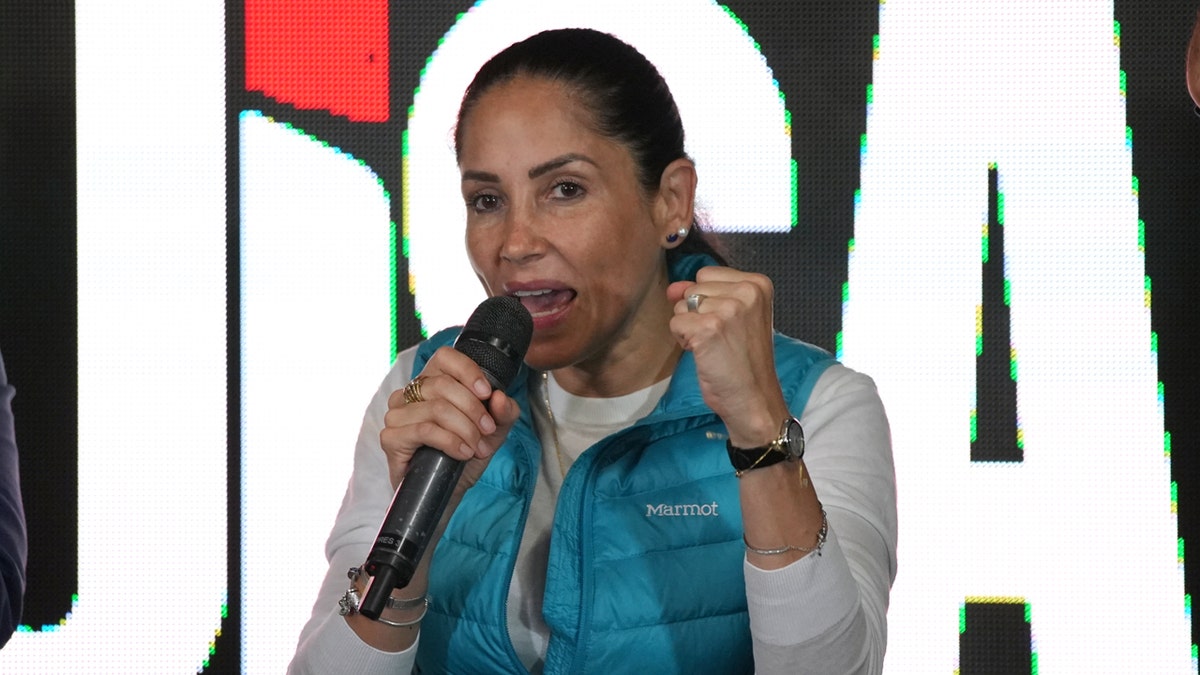
Luisa Gonzalez, presidential candidate for the Citizen Revolution Movement, speaks after polls closed for the presidential election in Quito, Ecuador, on Feb. 9, 2025. (AP Photo/Carlos Noriega)
His questioned tactics include the state of internal armed conflict he declared in January 2024 in order to mobilize the military in places where organized crime has taken hold, as well as last year’s approval of a police raid on Mexico’s embassy in the capital, Quito, to arrest former Vice President Jorge Glas, a convicted criminal and fugitive who had been living there for months.
His head-on approach, however, is also earning him votes.
«Noboa is the only person hitting organized crime hard,» retiree German Rizzo, who voted to get the president re-elected, said outside a polling station in Samborondón, an upper-class area with gated communities separated from the port city of Guayaquil by a river.
‘Things are not going to change’
González, 47, held various government jobs during the presidency of Correa, who led Ecuador from 2007 through 2017 with free-spending socially conservative policies and grew increasingly authoritarian in his last years as president. He was sentenced to prison in absentia in 2020 in a corruption scandal.
González was a lawmaker from 2021 until May 2023, when Lasso dissolved the National Assembly. She was unknown to most voters until Correa’s party picked her as its presidential candidate for the snap election.
Quito’s University of the Americas professor Maria Cristina Bayas said Sunday’s result was «a triumph» for Correa’s party because pre-election polls projected a wider difference between Noboa and González.
CLICK HERE TO GET THE FOX NEWS APP
Esteban Ron, dean of the Faculty of Social and Legal Sciences at the International University SEK in Quito, said Noboa will be forced to reengineer his campaign at the risk that he may have already reached his vote ceiling. Ron attributed the outcome to the problems Noboa faced during his administration.
Waiting for her turn to vote in Guayaquil, architecture student Keila Torres said she had not yet decided who to vote for. None, she said, will be able to lower crime across Ecuador due to deep-rooted government corruption.
«If I could, I wouldn’t be here,» said Torres, who witnessed three robberies in public buses over the past four years and barely escaped a carjacking in December. «Things are not going to change.»
INTERNACIONAL
Trump’s Gaza relocation proposal sparks heated debate among Palestinians: ‘no life left here’

President Donald Trump’s suggestion that Palestinians should leave Gaza to rebuild their lives after months of war has triggered a wave of reactions, exposing deep divisions within the enclave and across the Arab world.
Speaking alongside Israeli Prime Minister Benjamin Netanyahu at the White House last week, Trump outlined his vision for Gaza’s future, describing it as «the Riviera of the Middle East.» His proposal to relocate 1.8 million Palestinians sparked outrage among Palestinian leaders and drew mixed reactions from Gazans.
While some Gazans have rejected emigration, others see it as their only hope.
«I’m asking Donald Trump himself to relocate us as he suggested. And I’ll be the first one to go,» one young man told the Center for Peace Communications team in Gaza during a camera interview. The man described his bleak reality, saying, «I want to leave because there’s no life left here. Life here is gone. I mean, just look around you.»
THE HISTORY OF GAZA AMID TRUMP’S PLAN TO REBUILD ENCLAVE
A view of the widespread destruction in Gaza, Jabalia, on February 5, 2025. (YOUSSEF ALZANOUN/Middle East Images/AFP via Getty Images)
Another Gazan called on neighboring Arab countries to provide an escape route. «To our brotherly Egyptian and Jordanian people and King Abdullah—we hope they open the crossing for the youth who are leaving, for the wounded, for the sick, and the elderly who need treatment.»
Jordan’s King Abdullah is set to meet with President Trump on Tuesday, having rejected his plan for annexing Gaza and displacing Palestinians, Reuters reported.
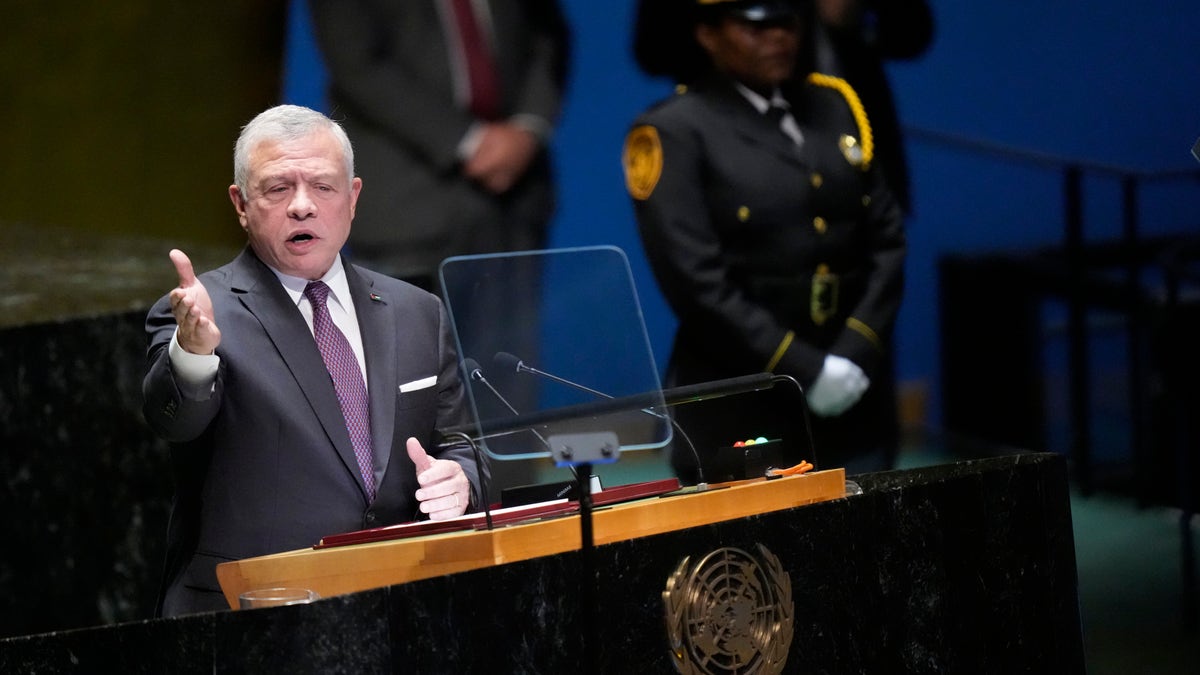
Jordanian King Abdullah meets President Trump on Tuesday having already rejected his plan for Gaza. (AP Photo/Mary Altaffer) (AP Photo/Mary Altaffer)
The Palestinian Center for Policy and Survey Research poll conducted before the October 7 terror attacks found that 31% of Gazans were already considering emigration—44% among young people. The most popular countries were Turkey, followed by Germany, Canada, the United States and Qatar.
The poll’s authors said, «The main drivers seem economic, political, educational, security and concerns about corruption.»
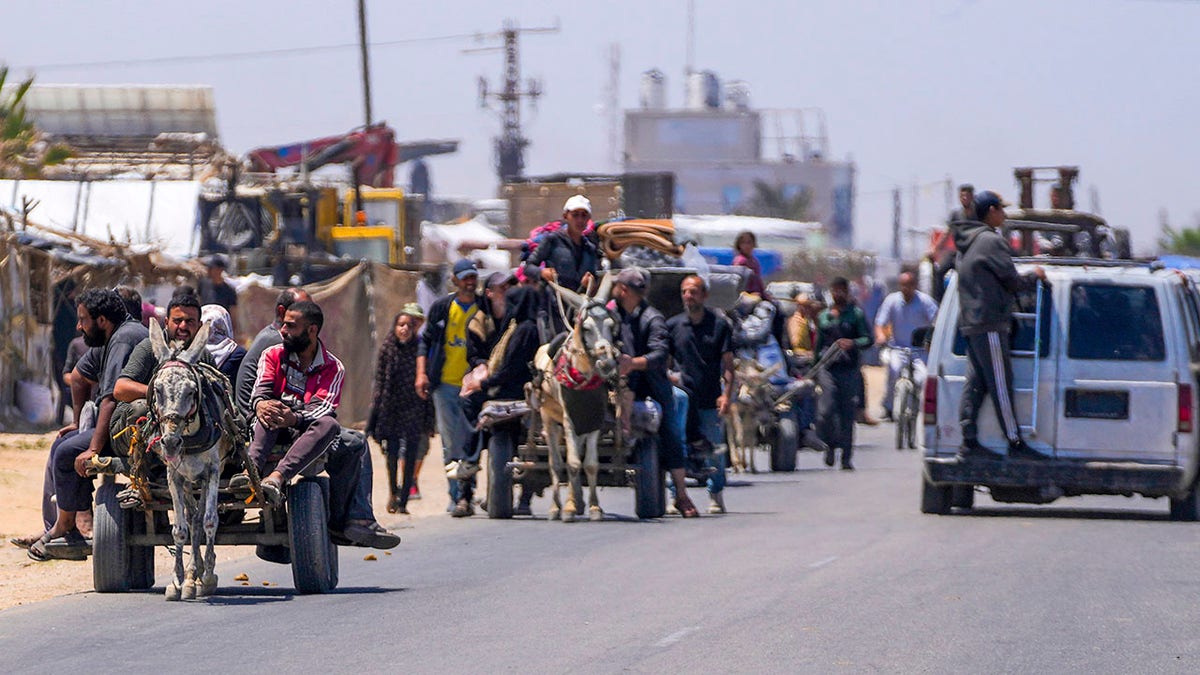
Displaced Palestinians arrive in central Gaza after fleeing from the southern Gaza city of Rafah on Thursday, May 9, 2024. (AP/Abdel Kareem Hana)
Joseph Braude, founder and president of the Center for Peace Communications, told Fox News Digital that the number has grown significantly due to the ongoing devastation. «Through our daily contact with Gazans from all walks of life across the coastal strip, we have seen that proportion grow, amid the destruction of the present war, to a substantial majority of the population.»
Ayman Khaled, a Palestinian journalist, echoed similar sentiments, pointing to the grim prospects for rebuilding Gaza after months of relentless Israeli bombardment. «Gaza will need to go through a very long period of reconstruction. In that long period of time, where will the youth go? Where will the wounded go? We have more than 100,000 wounded. Even before the last war, a stream of people were leaving Gaza—workers, students, business people. That’s how it looked then. Now, those trends will double. There is no hope for the reconstruction of Gaza, not in a year nor 10 nor 15.»
‘LEVEL IT’: TRUMP SAYS US WILL ‘TAKE OVER’ GAZA STRIP, REBUILD IT TO STABILIZE MIDDLE EAST
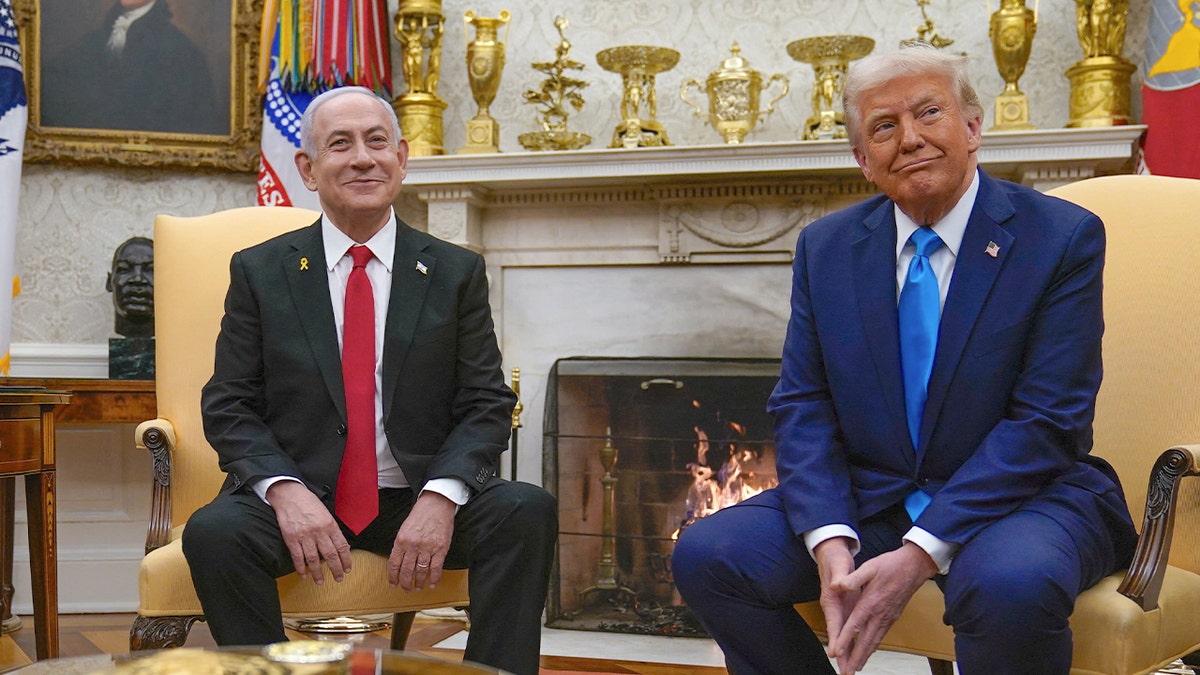
U.S. President Donald Trump and Israeli Prime Minister Benjamin Netanyahu meet at the White House in Washington, D.C., Feb. 4, 2025. (REUTERS/Elizabeth Frantz)
He also warned that as long as Hamas remains in power, cycles of violence will continue, pushing more people to flee. «If Hamas remains on the scene, this will keep happening. Every day, we’ll have new killings. After every battle, they say they are victorious—but what is this victory? If we don’t seriously address the issue of Hamas leaving the political scene, we cannot talk about anything else. If Hamas remains, people will emigrate, whether willingly or unwillingly.»
Hamas described Trump’s plan as a «recipe for creating chaos and tension in the region,» and for many Gazans, leaving is unthinkable. Speaking to The Associated Press, Mustafa al-Gazzar, a displaced Gazan, dismissed the idea of leaving. «You think you’ll expel me abroad and bring other people in my place? I would rather live in my tent, under rubble. I won’t leave. Put that in your brain.»
Amna Omar, 71, who has been sheltering in central Gaza, was equally defiant. «Gaza is our land, our home. We as Gazans… I don’t want to die in Egypt.»
Another woman in Deir al-Balah told Israeli news agency TPS-IL, «We clung to our destroyed homes and we clung to the soil of Palestine.» While voluntary emigration has been quietly discussed for years, Trump’s endorsement has turned it into a divisive issue. Arab governments, wary of being seen as complicit in Palestinian displacement, have been quick to condemn it.
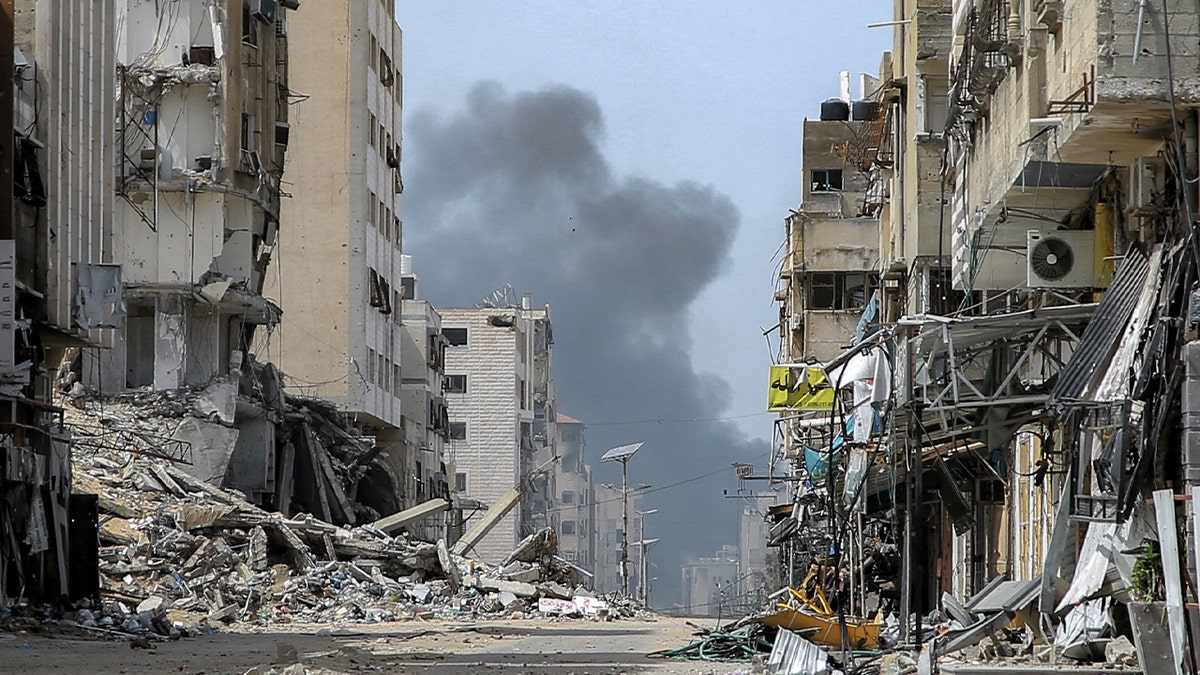
Smoke rises during an Israeli strike in the vicinity of the al-Shifa hospital in Gaza City on March 28, 2024 amid the ongoing conflict between Israel and Hamas terrorists. (AFP via Getty Images)
CLICK HERE TO GET THE FOX NEWS APP
However, with Gaza in ruins and no reconstruction in sight, the debate over emigration is no longer theoretical. The question is not whether Gazans want to leave, but whether they will have the opportunity to do so.
A Gazan man interviewed on-camera by the Center for Peace Communications said «In the end, people will accept reality. They’ll emigrate because they want to live. They want to live in a country that protects and supports them. A country where you can hold your head up high. If our country isn’t looking out for us, where should we go?»
Reuters and The Associated Press contributed to this article.
-
ECONOMIA3 días ago
Pelea por el atraso cambiario: Milei, enojado porque el FMI «no la ve» y lo presiona con una devaluación
-
POLITICA2 días ago
Javier Milei y sus medidas, EN VIVO: Elon Musk volvió a elogiar al Presidente y se declaró «gran fan»
-
SOCIEDAD3 días ago
«Más de 250.000 empleos perdidos: La crisis empresarial en Argentina sigue en aumento»
-
ECONOMIA22 horas ago
Tarjeteo récord: desde la City alertan que la salida de dólares por turismo creció de manera «impresionante»
-
CHIMENTOS2 días ago
El testimonio que complica a Jorge Rial, el papá de Morena: «Un hogar con mucha violencia»
-
SOCIEDAD2 días ago
Incendios en la Patagonia: Chubut ofrece 10 millones de pesos para identificar a quienes iniciaron el fuego






















